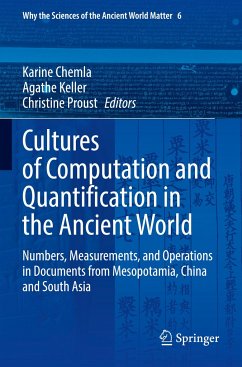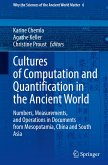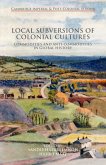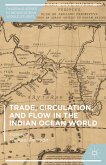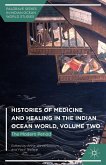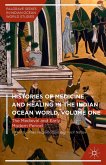This book sheds light on the variety of mathematical cultures in general. To do so, it concentrates on cultures of computation and quantification in the ancient world, mainly in ancient China, South Asia, and the Ancient Near East and offers case studies focused on numbers, quantities, and operations, in particular in relation to mathematics as well as administrative and economic activities.
The various chapters focus on the different ways and contexts of shaping numbers and quantities, and on the procedures applied to them. The book places special emphasis on the processes of emergence of place-value number systems, evidenced in the three geographical areas under study All these features yield essential elements that will enable historians of mathematics to further capture the diversity of computation practices in their contexts, whereas previous historical approaches have tended to emphasize elements that displayed uniformity within "civilizational" blocks. The book includes editions and translations of texts, some of them published here for the first time, maps, and conventions for editions of ancient texts. It thereby offers primary sources and methodological tools for teaching and learning.
The volume is aimed at historians and philosophers of science and mathematics, historians of the ancient worlds, historians of economics, sinologists, indologists, assyriologists, as well as undergraduate, graduate students and teachers in mathematics, the history and philosophy of science and mathematics, and in the history of ancient worlds.
The various chapters focus on the different ways and contexts of shaping numbers and quantities, and on the procedures applied to them. The book places special emphasis on the processes of emergence of place-value number systems, evidenced in the three geographical areas under study All these features yield essential elements that will enable historians of mathematics to further capture the diversity of computation practices in their contexts, whereas previous historical approaches have tended to emphasize elements that displayed uniformity within "civilizational" blocks. The book includes editions and translations of texts, some of them published here for the first time, maps, and conventions for editions of ancient texts. It thereby offers primary sources and methodological tools for teaching and learning.
The volume is aimed at historians and philosophers of science and mathematics, historians of the ancient worlds, historians of economics, sinologists, indologists, assyriologists, as well as undergraduate, graduate students and teachers in mathematics, the history and philosophy of science and mathematics, and in the history of ancient worlds.

